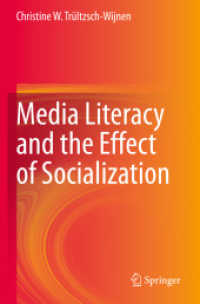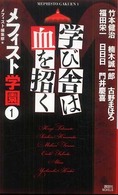- ホーム
- > 洋書
- > ドイツ書
- > Humanities, Arts & Music
- > Linguistics
- > english linguistics
Description
(Text)
The mystifications of pastoral which long blinded Dickens to contemporary political realities were compounded by his enthusiasm for the Victorian Nature cult inspired by Wordsworth. Growing awareness of the misery prevalent in rural England drastically radicalised him but also exacerbated his weakness for the neurotic versions of pastoral related to child-cult. The peculiarly Victorian male fantasies of the child-wife and 'Angel on the Hearth', however, offered no final security from the life-long dread of the working man's potential danger to social stability responsible for the reactionary tendencies of his later years.
(Table of content)
Contents: Romantic Nature in Dickens's Novels - 'Spots of Time': Nature and Imagination in Dickens and Wordsworth - Some Versions of Pastoral: Pastoral theory from William Empson to Raymond Williams - Early Dickensian Pastoral: 'Sunday Under Three Heads' and Pickwick - Chimes as anti-pastoral etc.
(Review)
"Johnson's analysis - lucid, carefully documented, and well-argued - seems both perceptive and sensible, particularly in its relatively full examination of the extent to which Dickens ø...! responded to Wordsworth." (Stanley Friedman, Dickens Studies Annual)
(Author portrait)
The Author: Derek Johnson was born in 1945 in Blackpool, where he attended Primary and Secondary School. He broke off an apprenticeship to emigrate to Canada, where he spent two and a half years working in mining and in factories. This was followed by two years in South America spent odd-jobbing mainly in Argentina and Chile. After marrying and settling in Switzerland he attended High School for adults in Zurich. Going on to the University of Zurich to study English, German and British & American History, he received his doctorate in 1990.








